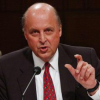John Negroponte

John Negroponte
John Dimitri Negroponteis a British-born American diplomat of Greek descent. He is currently a J.B. and Maurice C. Shapiro Professor of International Affairs at the George Washington University. Prior to this appointment, he served as a research fellow and lecturer in international affairs at Yale University's Jackson Institute for Global Affairs, United States Deputy Secretary of State, and the first ever Director of National Intelligence...
NationalityAmerican
ProfessionDiplomat
Date of Birth21 July 1939
CountryUnited States of America
We're not quite yet in a position to do that because there's been both a lot of work being done on it in Washington, plus we've been having consultations with some of the other key members of the council in capitals,
The populations of Central America are very, very small indeed, so that while no one was denying and this was one of the great debates we used to have, whose fault was it that there were communists were able to do so well down there, well, that wasn't the point.
We assessed the threat to U.S. national security posed by DP World to be low. In other words, we didn't see any red flags come up during the course of our inquiry.
We assessed the threat to U.S. national security posed by DP World to be low.
Globalization is causing a shift of momentum and energy to greater Asia, where China has steadily expanding reach and may become a peer competitor to the United States at some point.
Well my briefing was that Honduras was a small and vulnerable country just back on the path towards democracy it was about to have just before I arrived, the first elections for a civilian president in more than 9 years.
Those of us who actually were working in the region at the time will point out how strongly committed we were to supporting the democratic process and encouraging elections, in spite of the fact that a war was going on in several of these countries.
Our feeling is that we must change the way we do business.
Right, well I am, I was a career diplomat for 37 years from 1960 until 1997 during the early 1980s from 1981 to 1985 I was the United States Ambassador to Honduras.
I think the political leadership as well as the religious leadership is rising to this situation. They don't want to fall down that precipice, so they are struggling to avoid that.
I think then the conditions will be created for the most expeditious and effective delivery of humanitarian supplies.
We may find that our self-defense requires further actions with respect to other organizations and other states.
Such chaos in Nigeria could lead to disruption of oil supply, secessionist moves by regional governments, major refugee flow and instability elsewhere in West Africa.
Growing suspicions about Western intentions and Moscow's desire to demonstrate its independence and defend its own interests may make it harder to cooperate with Russia on areas of concern to the United States.